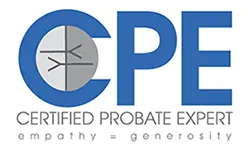frequently asked questions about probate
with over 20 years of experience
here are some of the common questions we get
With the complexities of the probate process, we're happy to answer any questions you may have.
There's no limit! We're here to help you make an
informed decision.
your vital information
starts here.
What is probate?
Probate is the legal process of administering a deceased person's estate. It involves identifying, gathering, and valuing the assets of an estate, paying any creditors or taxes, and then distributing the remaining assets to the heirs according to the provisions of a will (if one exists) or state laws.
What is a Certified Probate Expert?
A Certified Probate Expert is a specialist who has prescribed to a code of ethics, completed rigorous training, and is backed by a nationwide network of peers and mentors. They are highly knowledgeable in the probate process and are able to help families navigate the complexities of probate. They also provide advice and assistance on avoiding probate in the future as well.

Where does the probate process occur?
The probate process usually takes place in the county where the decedent last resided. If the decedent had assets in multiple states it may be necessary to open ancillary probate proceedings in multiple states, depending on the type and value of assets owned by the decedent.
Do I have to file probate if there’s a will?
Yes, it’s a common misconception that if a decedent had a will the estate does not require probate. However, validating a will is simply the first step in probate. The most common exemptions from probate are:
1) The decedent had a Living Trust
2) The decedent’s asset value is less than the state minimum for probate requirements.
When is probate not necessary?
In some cases, it may be possible to avoid probate. This can happen when the decedent's assets are held as Joint Tenants with Right of Survivorship, Trust Assets, Transfer on Death Accounts, or Payable on Death Accounts. It is also possible to avoid probate if the decedent's assets are of a low enough value to remain below the state’s exemption limit.
What does it mean to be the personal representative or executor of an estate?
Generally, a personal representative (a general term for the formal titles of Executor/Executrix, Administrator, Public Administrator/Fiduciary) is appointed by the will, the family, or the court to manage the estate. Regardless of title, this person has a fiduciary responsibility to the estate and must act in the best interest of the estate while following the succession plan as provided by the Will, or the state succession laws in the event there is no will.
Are there any tax implications of probate?
Yes. State laws may require that taxes be paid before any assets are distributed to heirs, and the executor or personal representative is responsible for making sure these taxes are paid. Additionally, any income generated by the estate may be subject to taxation before it is distributed. It is important to consult with a tax adviser or lawyer to ensure all taxes are paid properly.
How can I find out if I’m named in a will?
You can contact the probate court in the county where the decedent resided and ask if you are named in the will. You may also contact an attorney or the executor/personal representative to find out if you are named in the will.
Who are the heirs when there is no will or trust?
If there is no will or trust, the heirs are determined by state law. Generally, the surviving spouse, children and other relatives of the deceased will be considered heirs. It is important to consult with an attorney in your state to get an accurate answer as the laws vary from state to state.
Can a will be contested?
Yes, in some cases you may be able to contest a will. You should consult with an experienced attorney for advice about your specific situation.
How do I start the probate process?
The first step in the probate process is to obtain a certified copy of the death certificate from the county in which the decedent passed away. Once this has been obtained, the executor or personal representative of the estate will need to file a petition with the probate court in that same county in order to open the probate. If you live far away from the necessary court, try contacting a Certified Probate Expert in the decedent’s county.
What documents and information do I need for probate?
The documents and information required for probate will vary depending on the situation. Generally, you will need a copy of the death certificate and the will (if one exists). Other documents might include the title to real estate, deeds, bank and investment statements, tax returns, and inventory of assets. You will also need information about the decedent’s debts, creditors, and potential heirs.
How long does probate take?
The length of time required for probate will vary depending on the complexity of the estate and the amount of paperwork involved. Generally, it can take anywhere from 3-6 months for a straightforward probate, to up to two years or more for a complex estate. A Certified Probate Expert can help you navigate the process more efficiently and ensure that the probate is completed in a timely manner.
How much does probate cost?
The cost of probate depends on the complexity of the estate, but generally it will be around 5% of the gross value of the estate if you have legal representation (highly recommended for most). Probate costs usually include court filing fees, attorney fees, executor fees, and appraisal and accounting costs. It’s important to track expenses related to estate administration in case the expenses can be billed to the estate account.
When can I get my inheritance?
Your inheritance is usually distributed to heirs once the probate process has been completed. However, it can take several months or even years for all creditors to be paid and the process to be completed. In some cases, it may be possible to get an advance on inheritance. If you want to learn more, contact us.
What are the duties of the executor during probate?
The executor is responsible for handling all of the legal and financial matters related to the estate. This includes collecting and inventorying assets, paying debts and filing taxes, identifying heirs, and distributing assets to those entitled. The executor is also responsible for notifying creditors of the death and filing any necessary court documents.
What happens to the house when there is no will?
In most cases, the house will be included in the probate process. Depending on the laws in your state and other factors, it may be sold and the proceeds distributed to heirs, or it may be transferred directly to a beneficiary. Contacting a local Certified Probate Expert is the best way to get guidance on inherited property.
Can I sell an inherited house before probate is finished?
In some cases, it may be possible to sell an inherited house before probate is finished. However, this will depend on the laws in your state and other factors. There may also be other options to access the equity in the property without selling. .
I don’t live in the area. Do I have to be there in person?
An executor may not need to be present in person to fulfill their duties. Our team can be “boots on the ground” in many cases.
What should I do to prepare for a meeting with a probate attorney?
Before meeting with a probate attorney, it is important to gather all relevant documents related to the estate. This includes the will, any trusts that have been established, and any other asset or real estate paperwork. Additionally, you should compile a list of questions for your lawyer so you can get the most out of your consultation.
What happens to assets (real estate, vehicles, etc..) during probate?
Depending on the laws in your state, assets may need to be sold and the proceeds distributed to heirs or it may be transferred directly to a beneficiary.
What is probate litigation?
Probate litigation is a legal dispute concerning the validity of a will or executor’s actions. This type of litigation can be costly and time-consuming, so it is often best to get advice sooner than later. Get in touch with a Certified Probate Expert near you and ask them to connect with you an experienced probate litigation attorney.
What if my family member was a Medicaid recipient?
If your family member was a Medicaid recipient, the estate may need to pay back the government for any benefits received.
How can I avoid probate in the future?
The best way to avoid probate is to plan ahead. Creating a will, setting up a Living Trust, or transferring assets into joint ownership are all effective ways of ensuring that your estate passes directly to your heirs without going through probate court. Let us know if you’d like a referral to an estate planning attorney.
How can Certified Probate Experts help me?
A Certified Probate Expert can provide guidance throughout the entire probate process, and even after close. You’ll be working with someone local who understands timeframes and common obstacles, and knows the right people to call for any job.
We understand the probate process can be complex and overwhelming, which is why we're here to provide answers and support throughout your journey.
If you have any further questions or concerns We are here to answer any of your questions, big or small.
Contact us today so we can get started!
empathy. compassion. Experience. network.
Probate Captain is a subdivision of Revive It Property Solutions, South Jersey and Philadelphia's all-in-one real estate solutions provider.
© 2025 Probate Captain - Revive It Property Solutions, All Rights Reserved.

